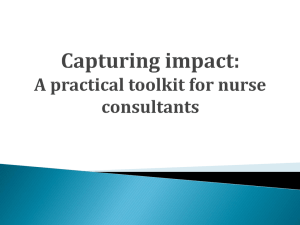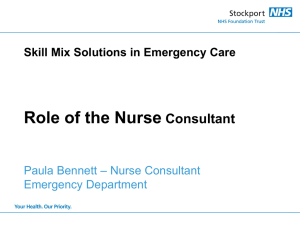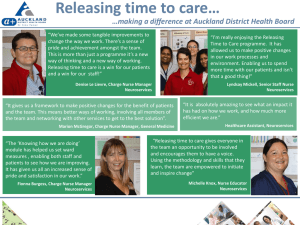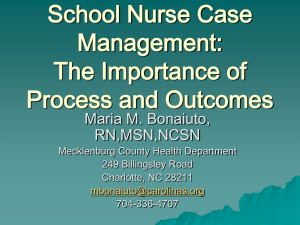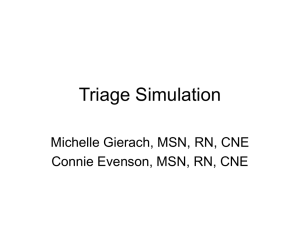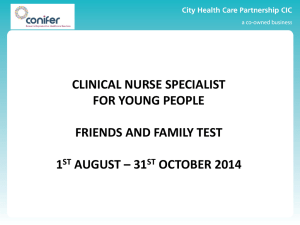Capturing the impact of Nurse Consultant Posts
advertisement
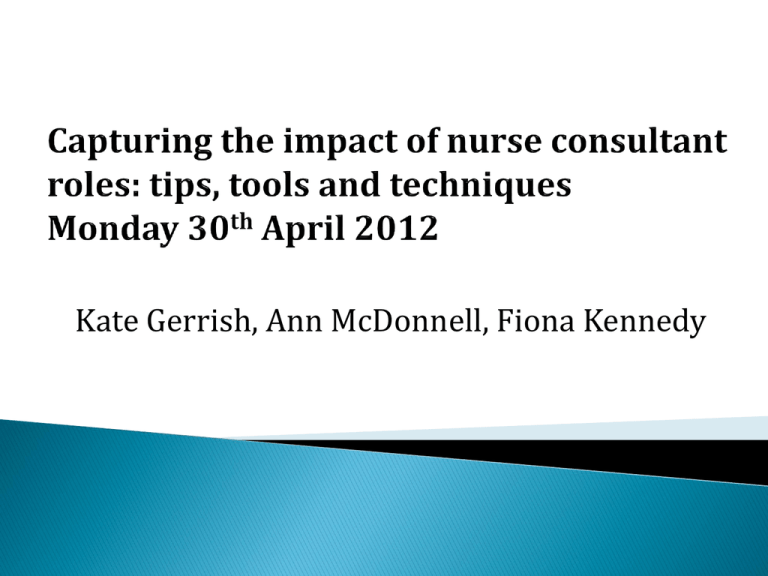
Kate Gerrish, Ann McDonnell, Fiona Kennedy Programme 13.00 Welcome & overview of the research project Kate Gerrish 13.15 Framework for capturing impact on patient, Ann McDonnell staff and the organisation 13.25 Practicalities of capturing impact Ann McDonnell 13.35 Toolkit for capturing impact Fiona Kennedy 13.55 Nurse consultants’ experiences of capturing impact Iain Armstrong Gill Bell 14.15 Question time Presenters 14.40 Break 15.00 Group work – using the toolkit to capture impact Kate Gerrish (co-ordinator) 16.10 Panel discussion Kate Gerrish (Chair) 16.40 Closing remark Kate Gerrish Kate Gerrish, Professor of Nursing Research University of Sheffield/Sheffield Teaching Hospitals NHS FT Email: kate.gerrish@sheffield.ac.uk Funded by The Burdett Trust for Nursing Nurse consultants (NC) introduced into the NHS in England in 2000 Gradual increase in numbers: 1091 NCs in post by 2010 Early evaluation: evidence of perceived impact on service development & leadership of frontline staff (Guest et al. 2004) Overall little robust evidence on the actual impact of NCs Impact of these multi-faceted roles is inherently hard to capture (Guest et al. 2004) Four components of role • Expert practice • Professional leadership & consultancy • Education, training & development • Service development, research & evaluation Issue of process and outcome Potential framework for outcome indicators (Gerrish et al 2007) • Clinical significance – patients • Professional significance – staff • ? Organisational significance – internal and external To identify a range of indicators to demonstrate the impact of nurse consultants on patient, staff and organisational outcomes To develop a toolkit/guidance to help nurse consultants to demonstrate their impact on patient, staff and organisational outcomes Stage 1 Systematic literature review (Kennedy et al 2011) Stage 2 Mapping exercise of nurse consultants Stage 3 Case studies of nurse consultants Stage 4 Iterative specialist panel linked to each case study Stage 5 Composite toolkit/guidance •whether the NC managed their own caseload Purposive sampling of 6 NCs in 5 hospitals in 2 trusts to achieve maximum variation Specialisms •whether the NC acted as a specialist advisor to front-line staff •the extent to which the role crossed organisational and professional boundaries •the extent to which the nurse consultant worked independently or as part of a multidisciplinary team •Gynaecology, neonatal care, pulmonary hypertension, sexual health, stroke, urology Participant Data collection Nurse consultant In-depth interview Follow-up in depth interview Professional colleagues Semi-structured interview Patients and family Semi-structured interview members Data analysis Framework approach (Ritchie and Spencer 1994) Specialist panel for each NC involving the NC, key stakeholders and the research team Areas of impact identified in case studies reviewed and consensus established regarding most important to capture and how NCs worked with research team for 6-8 weeks to pilot between 26 data collection instruments and strategies Follow up interviews with NC Exploration of practicalities of capturing impact Based on research findings Framework for capturing impact Practicalities of capturing impact Examples of tools used by NCs Initial validation NCs involved in project Wider group of nurse/midwife consultants Project Advisory Group – nurse consultants, chief nurses, lead nurse, patient representatives, academic researcher
